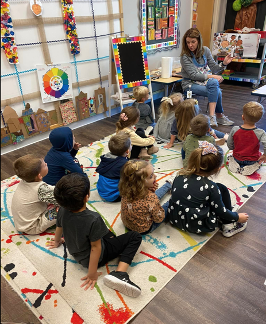Curriculum
Our curriculum is designed with the individual child in mind and is based on developmentally age-appropriate guidance and current research.
Teachers use monthly themes chosen by the administration team as well as additional online resources available to the teaching staff. To teach age-appropriate preschool spiritual concepts and Christian values our program uses Lifeway’s Levels of Biblical Learning.
Our program also uses the Texas Infant, Toddler, and Three-Year-Old Early Learning Guidelines, Texas Prekindergarten Guidelines and the Kindergarten Texas Essential Knowledge and Skills (TEKS) to assist in planning quality learning experiences.
Teachers' monthly lesson plans encompass all aspects of learning and embraces the following concepts;
Teachers use monthly themes chosen by the administration team as well as additional online resources available to the teaching staff. To teach age-appropriate preschool spiritual concepts and Christian values our program uses Lifeway’s Levels of Biblical Learning.
Our program also uses the Texas Infant, Toddler, and Three-Year-Old Early Learning Guidelines, Texas Prekindergarten Guidelines and the Kindergarten Texas Essential Knowledge and Skills (TEKS) to assist in planning quality learning experiences.
Teachers' monthly lesson plans encompass all aspects of learning and embraces the following concepts;

Is Biblically Based: Each unit includes a Bible story and Bible thoughts. The same phrases and verses are repeated throughout the unit of teaching.
Is Activity-Based: Preschoolers are active learners and must be involved in activities that do not force all the children to do the same thing at the same time. Learning center activities allow children to learn through experience rather than simply listening.
Provides Choices: Preschoolers have the opportunity to choose which centers to work in, what to build with the blocks, or where to put the paint on their paper. Teachers provide an environment filled with unit-related choices and a child chooses what interests them.
Allows Physical Development: Because muscles are growing and developing, preschoolers need to be able to move about freely. Learning activities allow children to work a puzzle, draw a picture, play in the home living center, or enjoy a book.
Encourages Creative Expression: As a teacher develops activities related to a unit theme, creative expression in art, writing, puzzles, music, and other activities belong to the child. Every child is creative. Each child is allowed to express themselves and experiment with their own design rather than a teacher providing a "pattern" or assisting them with an art activity. The experience, rather than the finished product, is the goal. Children become confident as they use their own ideas.
Includes Beginning Group Experiences: While younger preschoolers will only be aware of themselves and their own activity (solitary play), they will eventually move to parallel play, and finally to group participation. Plans for group-time consider the age of the preschooler and attention span.
Makes Learning Fun: When preschoolers are allowed to move around, express their own creativity, and choose what interests them, they will be successful, relate positively to others, and enjoy learning.
Invites Conversation: Preschoolers learn through simple conversations about God, the world He made, and how to treat each other.
Is Activity-Based: Preschoolers are active learners and must be involved in activities that do not force all the children to do the same thing at the same time. Learning center activities allow children to learn through experience rather than simply listening.
Provides Choices: Preschoolers have the opportunity to choose which centers to work in, what to build with the blocks, or where to put the paint on their paper. Teachers provide an environment filled with unit-related choices and a child chooses what interests them.
Allows Physical Development: Because muscles are growing and developing, preschoolers need to be able to move about freely. Learning activities allow children to work a puzzle, draw a picture, play in the home living center, or enjoy a book.
Encourages Creative Expression: As a teacher develops activities related to a unit theme, creative expression in art, writing, puzzles, music, and other activities belong to the child. Every child is creative. Each child is allowed to express themselves and experiment with their own design rather than a teacher providing a "pattern" or assisting them with an art activity. The experience, rather than the finished product, is the goal. Children become confident as they use their own ideas.
Includes Beginning Group Experiences: While younger preschoolers will only be aware of themselves and their own activity (solitary play), they will eventually move to parallel play, and finally to group participation. Plans for group-time consider the age of the preschooler and attention span.
Makes Learning Fun: When preschoolers are allowed to move around, express their own creativity, and choose what interests them, they will be successful, relate positively to others, and enjoy learning.
Invites Conversation: Preschoolers learn through simple conversations about God, the world He made, and how to treat each other.






